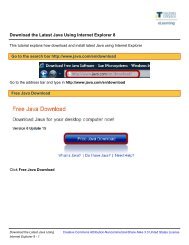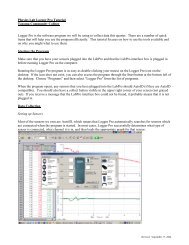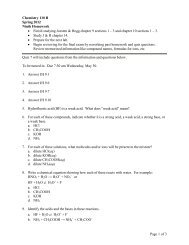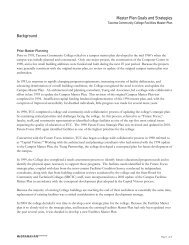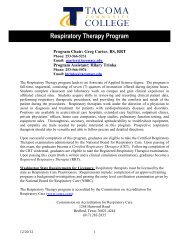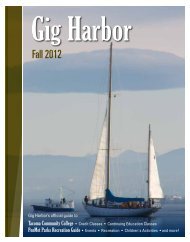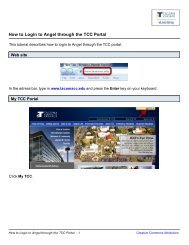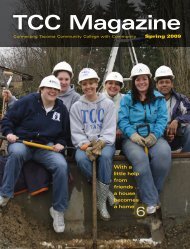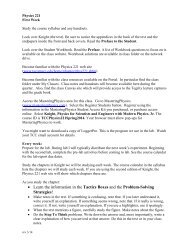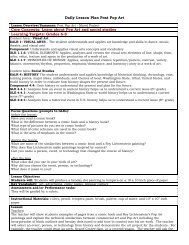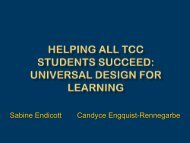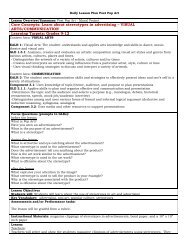2005-07 Catalog - Tacoma Community College
2005-07 Catalog - Tacoma Community College
2005-07 Catalog - Tacoma Community College
- No tags were found...
Create successful ePaper yourself
Turn your PDF publications into a flip-book with our unique Google optimized e-Paper software.
100 Credit Course Descriptions<strong>Tacoma</strong> <strong>Community</strong> <strong>College</strong>Educationtransfer to a four-year school to completea degree in Elementary or SecondaryEducation. TCC is currently developingarticulation agreements with selected fouryearschools, and specific courserecommendations will be forthcoming.Watch the quarterly schedules under theEducation section for new courseofferings.Students are reminded that successfulcompletion of recommended courseworkdoes not guarantee admission to auniversity college of education. Additionalcriteria, such as grade point average,community service, leadership activitiesand prior classroom experience (e.g.volunteer tutoring), may also be used by acollege of education in making admissiondecisions. For current informationcontact: the Education coordinator at253.566.5010.Paraeducator, Early Childhood (EDP), page 124.Art for Elementary Education (ART 180), page 89.Children’s Literature (ENGL 260), page 104.Math for Elementary Education (MATH 170),page 119.Music for Elementary Education (MUSIC 120),page 120.EDUC 135 (varies)Child Development (5)Growth and guidance of young children,their mental, emotional, physical and socialdevelopment; meeting the needs of childrenin the family; observation of young children.EDUC 150Classroom Technologies (2)The course familiarizes students with avariety of technology software packages andapplications, emphasizing how these aresuccessfully used in the K-12 classroom.Students will also explore the pedagogicalconsiderations regarding technology as ateaching/learning tool.EDUC 151Electronic Portfolios (2)The course familiarizes students withelectronic portfolios, which can be used inboth classroom settings or as a way ofpresenting professional credentials. Studentswill leave the course with the initialprofessional electronic portfolio.EDUC 201 (F, W, Sp)Introduction to Education (5)Designed for students who are consideringteaching as a profession, the course willexamine historical and philosophicalfoundations of American education, learningtheories, contemporary students, andcurriculum development. The course willalso explore the social, political, cultural, andeconomic pressures that influence currentissues and trends in education. Includesrequired lab experience that gives studentsopportunities to practice learned concepts.(multicultural content)EDUC 220Diversity in Education (5)Examination of the relationship of culturalvalues to the formation of the child’s selfconceptand learning styles. Examination ofthe role of prejudice, stereotyping and culturalincompatibilities in education. Emphasis onpreparing future teachers to offer an equaleducational opportunity to children of allsocioeconomic and cultural groups, as well asinclusion of exceptional children.EDUC 299 (F, Sp)Early Childhood Field Experience (2)This class taken concurrently with EDP 100(Introduction to Early Childhood Education)will provide the opportunity to work withchildren in ECE classrooms, learning andimplementing developmentally appropriatepractices in guidance, curriculum,observation, assessment and the preparationof the physical environment.ElectronicsELEC 104 (F)Fundamentals of Electricity and Electronics (5)Basic knowledge and skills of DC and ACelectrical circuits including circuit analysis,recognition, and use of electricalcomponents and electrical measurementinstruments. Covers voltage, resistance,current, power, Ohm's Law, inductors,capacitors, series and parallel circuits, phaseresonance and circuit transients.Prerequisite: One year of high school algebra.ELEC 106 (F)AC Electronic Devices and Systems (5)This course covers AC electrical circuitsincluding circuit analysis, recognition and useof electrical components. Students will gain aworking knowledge of modern electronicdevices and the circuits in which they areemployed. It also covers electronicstroubleshooting techniques, rectifiers,transistors, filters, amplifiers, and noisereduction.Prerequisite: One year of high school algebra.ELEC 1<strong>07</strong> (W)Solid State Electronic Devices (5)This course covers AC electrical devices;including circuit analysis, recognition and useof diodes and transistors. It also coverstroubleshooting techniques for transistorsand amplifiers. Students will gain a workingknowledge of amplifier circuits,classifications, and frequency response.Prerequisite: One year of high school algebra.ELEC 108 (W)Electronic Devices and Integrated Circuits (5)This course provides a comprehensivecoverage of electronic devices and circuitsincluding linear integrated circuits,troubleshooting and practical applications.Major concepts, such as operationalamplifiers, active filters, oscillators,communications circuits, and voltageregulators will be covered.Prerequisite: One year of high school algebra.ELEC 109 (Sp)Microprocessors (5)A comprehensive, microprocessor coursecovering microprocessor theory andoperation, computer arithmetic andinterfacing.ELEC 110 (Sp)Digital Devices (5)This course covers digital devices and theircommon uses. The students will learn aboutdifferent numbering systems, codes, BooleanAlgebra, and logic simplification. Alsocovered in the course are memory devices,microprocessors, and integrated circuittechnologies.Prerequisite: One year of high school algebra.



